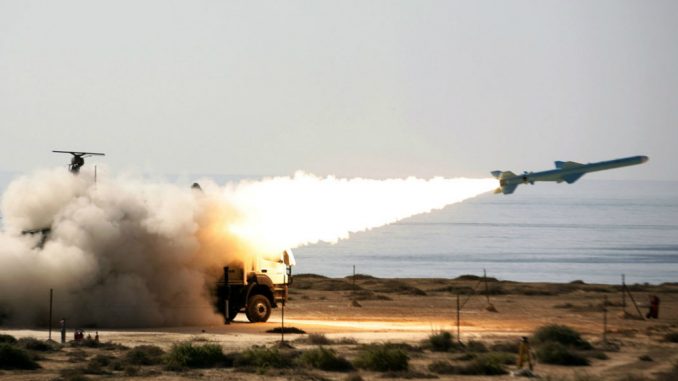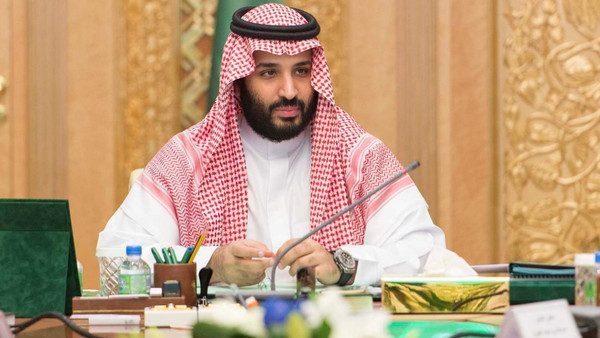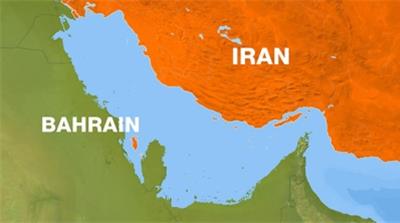
Iranian military forces have held military drills in the weekend as a clear reply to the new US sanctions against the republic while sending threats again and saying they are ready to repel any offensive.
The Iranian Revolution Guards Corps (IRGC) launched military drills dubbed in Semnan province in Northern Iran on Saturday, after the US administration imposed new sanctions on Iranian figures.
According to Fars news agency, the drills are being held in an area of 35,000 square kilometers, and are aimed at “demonstrating Iran’s power, intelligence command, and defense readiness to counter any threats.”
Different types of home-made missile and radar systems were used during the exercises.
The missile systems used in the drills included Khordad-III missile system with a range of 75 kilometers and capability of targeting several targets at the same time, Tabas missile system with a range of 60 kilometers also capable of hitting multiple enemy targets and Sayyad-II missile system with range of 75 kilometers and capable of confronting the enemy’s electronic warfare.
The radar systems also used in the massive drills included long-range Qadir radar system with a tracking range of up to 1,100 kilometers, Matla al-Fajr radar system with a range of 500 kilometers and capable of tracking different kinds of aircraft and drones and Kavosh radar system with a range of 150 kilometers and capable of tracking air threats at low altitudes, including cruise missiles and different aircraft.
New threats to the US and Israel
Commander of the IRGC Aerospace Force Brigadier General Amir Ali Hajizadeh played down the recent allegations by the US officials against Iran’s defense program, but meantime warned Washington to avoid hostile action or wait for a harsh response.
“If the enemy makes a mistake our roaring missiles will hit their targets,” General Hajizadeh told reporters on the sidelines of massive military drills dubbed ‘Modafe’an Harim-e Aseman Velayat’ (Defenders of the Velayat Skies) in Semnan province in Northern Iran on Saturday.
He pointed to the preparedness of the Iranian Armed Forces, and said, “Knowing the capabilities of our Armed Forces, I am to ensure you that foreign threats cannot do us any harm.”
General Hajizadeh pointed to the US officials’ remarks about Iran’s missile tests, and said Washington officials are only after “a pretext to show their animosity towards us; we are making round-the-clock efforts to defend our country’s security and if the enemy dares to make any mistake our roaring missiles will land on them.”
He also referred to the massive military drills in Semnan province, and said, “The main phase of the military drills of the aerospace air defense command started today after its successful accomplishment in the preliminary phase.”
“All the equipment deployed in the air defense drills, including missile systems, radar systems, command control centers and electronic warfare were indigenous and made by Iranian experts and engineers,” General Hajizadeh added.
In addition, a senior Iranian government official said Saturday Tehran was prepared to attack Tel Aviv and destroy a U.S. military base in Bahrain if the Trump White House ordered a military strike against Iran.
“The US army’s fifth fleet has occupied a part of Bahrain, and the enemy’s farthest military base is in the Indian Ocean but these points are all within the range of Iran’s missile systems and they will be razed to the ground if the enemy makes a mistake,” Mojtaba Zonour said.
Stressing that Tehran has prepared its forces for asymmetric war and attained great achievements in the missile field, he said if the enemy fires a missile against Iran, the country will immediately retaliate it with firing a missile at Tel Aviv.
“And only 7 minutes is needed for the Iranian missile to hit Tel Aviv,” Zonour said.
How the relationship worsened in a week
Barack Obama, The former US leader, was behind the historic Iran nuclear deal with P5+1 powers, agreed upon last year, which saw Tehran agree to amend its nuclear output in order to lift all nuclear-related economic sanctions, freeing up tens of billions of dollars in oil revenue and frozen assets.
After lifting the sanctions, Iranian president Hassan Rouhani visited Europe and made deals that worth billions of dollars. European companies started looking for investment opportunities in the growing Iranian market.
However, Trump’s election might change the whole game and threaten the development that was built in the past months.
Trump has said during his election campaign that the deal as “disastrous” and said it would be his “number one priority” to dismantle it.
These threats became clearer after Trump’s inauguration, as he signed an executive order temporarily barring thousands from seven countries in the Middle East and Africa, including Iran, from obtaining visas to travel to the United States.
In a clear challenge, a ballistic missile test was conducted by Iran on Sunday.
A U.S. defense official said that the missile test ended with a “failed” re-entry into the earth’s atmosphere, and later German sources said that the test included nuclear-capable missiles that are considered a breach of the nuclear deal.
After that Trump announced that “we’re officially putting Iran on notice”, and declared new sanctions against Iran later.
Iran’s response and the long-awaited chance
Iran is likely to calibrate its responses based on how the U.S. acts.
Tougher U.S. sanctions could convince Tehran to start reinterpreting the terms of the nuclear deal, said Mohammad Marandi, a political analyst in Tehran.
“The Iranians will reciprocate,” he said. “The more the Americans disregard the agreement … the more the Iranians will find new ways of interpreting the text that do not work to the benefit of the United States.”
Ali-Akbar Velayati, the foreign adviser of Ayatollah Ali Khamenei, Iran’s supreme leader, predicted this week that “the US will be the final loser”.
“It is not for the first time that a naive person from the US poses threats to Iran,” he told state media.
“Our missile drills are a show of our might,” added Tehran Friday prayer leader Ayatollah Ahmad Khatami. “We are living in a world of wolves – wolves such as the arrogant government of America. In this world of wolves, should we remain unarmed and they do whatever damn things they want? No way! This will never happen!”
More direct action could include an uptick in harassment of U.S. warships by Revolutionary Guard speedboats in the Gulf, or new cyberattacks like one that crippled the network of Saudi Arabia’s state oil company in 2012.
Iran also could boost support for regional allies such as Lebanon’s Hezbollah or the Houthis in Yemen.
In addition, this war can be the political victory that the hardliners have sought since te nuclear deal
Iranian Supreme Leader Ali Khamenei regularly criticizes the United States and the deal, saying it should not be trusted and it wasn’t doing its part of the deal.
Khamenei has already promised to “set fire” to the nuclear deal if the West violates it. and has repeatedly complained it has not received benefits promised.
Trump’s war on Iran would just prove him right and will strengthen his hold on the Iranians’ minds, who will just see the west as the devil their leader always spoke about.



